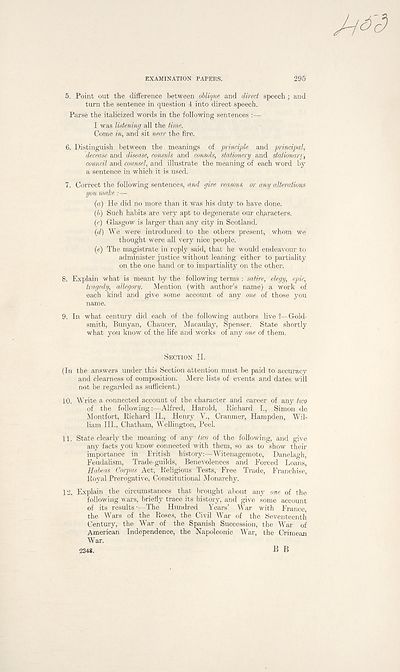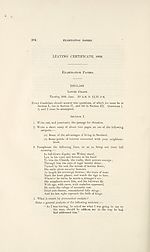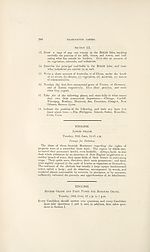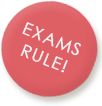Download files
Complete book:
Individual page:
Thumbnail gallery: Grid view | List view

EXAMINATION PAPERS.
295
5. Point out the difference between oblique and direct speech ; and
turn the sentence in question 4 into direct speech.
Parse the italicized words in the following sentences :—
I was listening all the time.
Come in, and sit near the fire.
6. Distinguish between the meanings of pinciple and principal,
decease and disease, consuls and consols, stationery and stationary,
comicil and counsel, and illustrate the meaning of each word by
a sentence in which it is used.
7. Correct the following sentences, and give reasons or any alterations
ym make:—
(a) He did no more than it was his duty to have done.
(b) Such habits are very apt to degenerate our ch,aracters.
(c) Glasgow is larger than any city in Scotland.
(d) We were introduced to the others present, whom we
thought were all very nice people.
(e) The magistrate in reply said, that he would endeavour to
administer justice without leaning either to partiality
on the one hand or to impartiality on the other.
8. Explain what is meant by the following terms : satire, elegy, epic,
tragedy, allegory. Mention (with author’s name) a work of
each kind and give some account of any one of those you
name.
9. In what century did each of the following authors live 1—Gold¬
smith, Bunyan, Chaucer, Macaulay, Spenser. State shortly
what you know of the life and works of any one of them.
Section II.
(In the answers under this Section attention must be paid to accuracy
and clearness of composition. Mere lists of events and dates will
not be regarded as sufficient.)
10. Write a connected account of the character and career of any km
of the following:—Alfred, Harold, Richard L, Simon de
Montfort, Richard II., Henry V., Cranmer, Hampden, Wil¬
liam HI., Chatham, Wellington, Peel.
11. State clearly the meaning of any two of the following, and give
any facts you know connected with them, so as to show their
importance in British history:—Witenagemote, Danelagh,
Feudalism, Trade-guilds, Benevolences and Forced Loans,
Habeas Corpus Act, Religious Tests, Free Trade, Franchise,
Royal Prerogative, Constitutional Monarchy.
12. Explain the circumstances that brought about any one of the
following wars, briefly trace its history, and give some account
of its results •—The Hundred Years’ War with France,
the Wars of the Roses, the Civil War of the Seventeenth
Century, the War of the Spanish Succession, the Mar of
American Independence, the Napoleonic War, the Crimean
War.
B B
2348.
295
5. Point out the difference between oblique and direct speech ; and
turn the sentence in question 4 into direct speech.
Parse the italicized words in the following sentences :—
I was listening all the time.
Come in, and sit near the fire.
6. Distinguish between the meanings of pinciple and principal,
decease and disease, consuls and consols, stationery and stationary,
comicil and counsel, and illustrate the meaning of each word by
a sentence in which it is used.
7. Correct the following sentences, and give reasons or any alterations
ym make:—
(a) He did no more than it was his duty to have done.
(b) Such habits are very apt to degenerate our ch,aracters.
(c) Glasgow is larger than any city in Scotland.
(d) We were introduced to the others present, whom we
thought were all very nice people.
(e) The magistrate in reply said, that he would endeavour to
administer justice without leaning either to partiality
on the one hand or to impartiality on the other.
8. Explain what is meant by the following terms : satire, elegy, epic,
tragedy, allegory. Mention (with author’s name) a work of
each kind and give some account of any one of those you
name.
9. In what century did each of the following authors live 1—Gold¬
smith, Bunyan, Chaucer, Macaulay, Spenser. State shortly
what you know of the life and works of any one of them.
Section II.
(In the answers under this Section attention must be paid to accuracy
and clearness of composition. Mere lists of events and dates will
not be regarded as sufficient.)
10. Write a connected account of the character and career of any km
of the following:—Alfred, Harold, Richard L, Simon de
Montfort, Richard II., Henry V., Cranmer, Hampden, Wil¬
liam HI., Chatham, Wellington, Peel.
11. State clearly the meaning of any two of the following, and give
any facts you know connected with them, so as to show their
importance in British history:—Witenagemote, Danelagh,
Feudalism, Trade-guilds, Benevolences and Forced Loans,
Habeas Corpus Act, Religious Tests, Free Trade, Franchise,
Royal Prerogative, Constitutional Monarchy.
12. Explain the circumstances that brought about any one of the
following wars, briefly trace its history, and give some account
of its results •—The Hundred Years’ War with France,
the Wars of the Roses, the Civil War of the Seventeenth
Century, the War of the Spanish Succession, the Mar of
American Independence, the Napoleonic War, the Crimean
War.
B B
2348.
Set display mode to:
![]() Universal Viewer |
Universal Viewer | ![]() Mirador |
Large image | Transcription
Mirador |
Large image | Transcription
Images and transcriptions on this page, including medium image downloads, may be used under the Creative Commons Attribution 4.0 International Licence unless otherwise stated. ![]()
| Scottish school exams and circulars > Leaving Certificate > (2) |
|---|
| Permanent URL | https://digital.nls.uk/144140692 |
|---|
| Shelfmark | P.P. 1899 XXVI |
|---|---|
| Attribution and copyright: |
|
| Description | Examination papers for the School Leaving Certificate 1888-1961 and the Scottish Certificate of Education 1962-1963. Produced by the Scotch (later 'Scottish') Education Department, these exam papers show how education developed in Scotland over this period, with a growing choice of subjects. Comparing them with current exam papers, there are obvious differences in the content and standards of the questions, and also in the layout and use of language |
|---|---|
| Additional NLS resources: |
|



